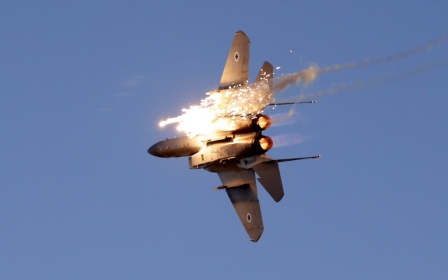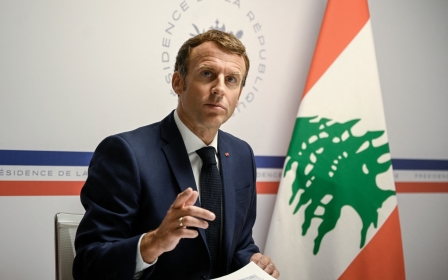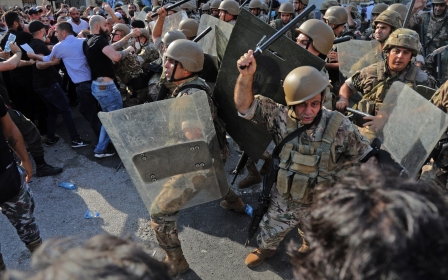Lebanon: At least 28 killed in fuel tanker explosion in Akkar
At least 28 people were killed and 79 injured in a fuel tank explosion on Sunday in the Akkar region in northern Lebanon, according to the health ministry.
The incident came amid warnings that dire fuel shortages in Lebanon could cause hundreds of deaths in hospitals in the coming days.
Reuters reported that military and security sources said that the Lebanese army had seized a hidden fuel storage tank in the town of Altalil and was in the midst of handing out gasoline to residents when the explosion took place.
About 200 people were nearby at the time of the explosion, eyewitnesses told the news agency.
There were differing accounts as to the cause of the explosion.
New MEE newsletter: Jerusalem Dispatch
Sign up to get the latest insights and analysis on Israel-Palestine, alongside Turkey Unpacked and other MEE newsletters
"There was a rush of people, and arguments between some of them led to gunfire, which hit the tank of gasoline, and so it exploded," a security source told Reuters, noting that there were members of army and security forces among the casualties.
Local Al-Jadeed TV channel reported from eyewitnesses that an individual who ignited a lighter was the cause.
Abdelrahman, whose face and body was covered in gauze as he lay in Tripoli's al-Salam Hospital, was one of those in line to get some precious gasoline.
"There were hundreds gathered there, right next to the tank, and God only knows what happened to them," he said.
The father of another casualty at the hospital said he had two other sons he still hadn't located.
The Red Cross said its teams were still searching the explosion site, sharing on Twitter a photo of several people walking inside a large crater.
A 'tragedy'
Angry residents in Akkar, one of Lebanon's poorest areas, gathered at the site and set fire to two dump trucks, according to a Reuters witness.
Some of the injured were sent to hospitals in nearby Tripoli, while others were sent to Beirut, said Rashid Maqsood, an official with the Islamic Medical Association.
The majority of the injured are in serious condition, said Dr Salah Ishaq of al-Salam Hospital. "We can't accommodate them, we don't have the capabilities. It's a very bad situation."

Former prime minister Saad al-Hariri described the explosion as a "massacre".
"The Akkar massacre is no different from the [Beirut] port massacre," he said on Twitter, referring to the August 2020 explosion of ammonium nitrate stored in a port warehouse, which killed more than 200 people and injured thousands of others. Hariri called on Lebanese officials, including the president, to take responsibility for the latest incident and resign.
Hariri is the leading Sunni Muslim politician, the dominant religion in Lebanon's north, and has been in open opposition to Lebanese President Michel Aoun.
Aoun wrote on Twitter "this tragedy that befell our dear Akkar has made the hearts of all Lebanese bleed," adding that he asked the judiciary to investigate the circumstances that led to the explosion.
Reuters and Middle East Eye were unable to immediately reach Red Cross and Lebanese officials for comment.
Fuel crisis
Lebanon is grappling with a financial crisis branded by the World Bank as one of the world's worst since the 1850s.
Foreign currency reserves are declining fast, forcing the central bank to scale down funding for imports in an effort to shore up the little money Lebanon has left.
The Lebanese pound has lost more than 90 percent of its value on the black market, and 78 percent of the population lives below the poverty line.
On Wednesday, central bank chief Riad Salameh said he would scrap fuel subsidies to ease pressure on the fast-depleting foreign reserves.
His decision sparked panic, with huge queues forming outside bakeries and petrol stations as people struggled to stock up.
Fuel importers blame the crisis on delays by the central bank in opening credit lines to fund imports.
Last month, Iraq signed an agreement to provide the Lebanese government with 1 million tonnes of heavy fuel oil a year in return for goods and services. Lebanon's caretaker energy minister, Raymond Ghajar, said the Iraqi oil would be used for electricity generation and would be enough for four months.
*Reuters contributed to this report
Middle East Eye delivers independent and unrivalled coverage and analysis of the Middle East, North Africa and beyond. To learn more about republishing this content and the associated fees, please fill out this form. More about MEE can be found here.




